May 06, 2020
Women of Lyric
20th-century legends of Lyric's stage
Onstage at Lyric, from the earliest years of the company's history, the contributions of extraordinarily gifted women have been central and vital. In this blog post, we pay tribute to just a few of those legendary women, whose artistry was transcendent and whose performances will remain unforgettable for all who saw and heard them.
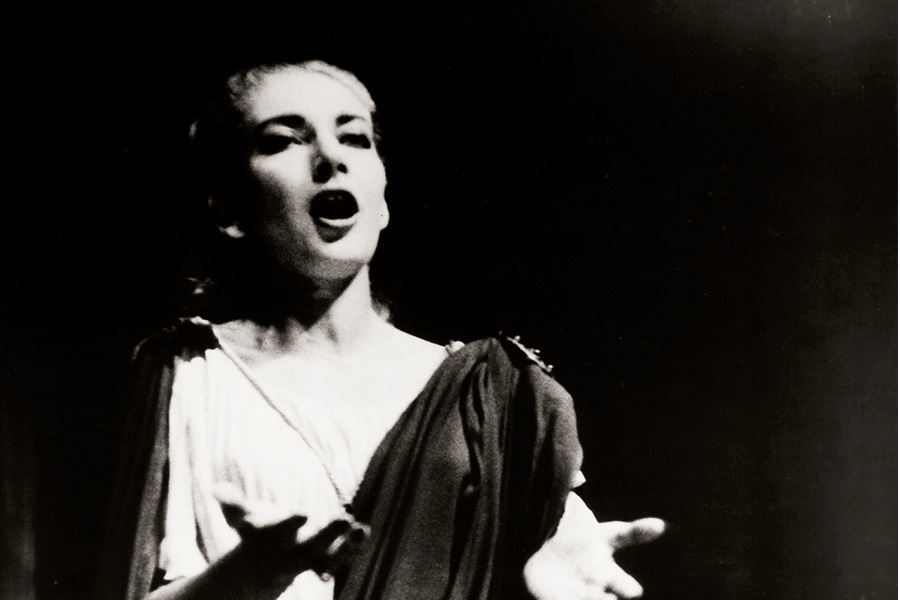
Maria Callas in the title role of Norma, 1954.
Maria Callas
Maria Callas (1923-77), born in New York City, trained in Greece as a teenager and was already a star of the major Italian theaters by the time America first heard her. The greatest coup in the history of Lyric was general manager Carol Fox’s engagement of Callas not only to make her American debut, but to do so inaugurating the fledgling company then known as Lyric Theatre of Chicago. With that debut performance in Bellini's Norma on November 1, 1954, Callas instantly established Lyric as a company worthy of international attention.
Callas sang five more roles at Lyric during the company's first two seasons (in Lyric's initial years, opera seasons were barely a month long, with just two performances per opera each November, so singers often performed in multiple operas per season). Her remaining roles in 1954 included two other signature portrayals, Verdi’s Violetta and Donizetti’s Lucia. The following year she moved from Bellini (Elvira in I puritani) to Verdi (Leonora in Il trovatore) and finally Puccini (the title role of Madama Butterfly). Puritani and Trovatore, both early-career successes elsewhere, were Callas’s final stage appearances in those operas, and after singing her first Butterfly performances onstage at Lyric, she never sang that role again. After the two scheduled performances of Puccini’s opera, the company added a third by popular demand. The line for tickets (which sold out within hours) extended around the block.
Those who attended Callas’s Lyric performances came away with memories that have stayed with them the rest of their lives. Each portrayal was a complete realization of a character, created with extraordinary musical and dramatic intelligence. Opinions on Callas’s actual singing in Chicago were divided (indeed, they always were throughout her career), but there was never the slightest doubt from anyone regarding her power to mesmerize an audience.
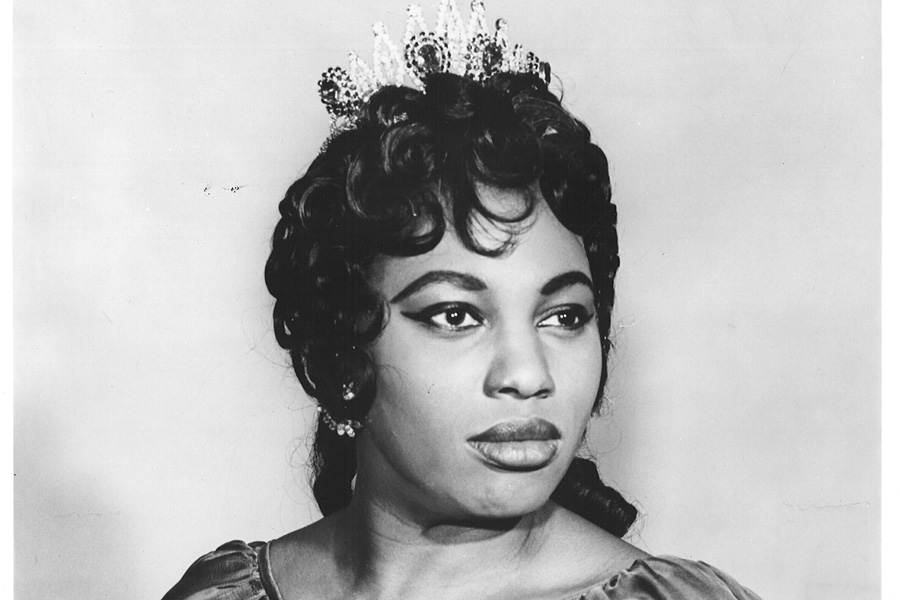
Leontyne Price as Thaïs, 1959
Leontyne Price
The pride of Laurel, Mississippi, Leontyne Price (b. 1927) is universally acknowledged as one of the greatest artists of the twentieth century. The soprano’s gifts were recognized initially with her portrayal of Bess in Porgy and Bess (seen internationally when she was still in her mid-twenties, including a 1952 run at the Civic Opera House, two years before Lyric’s first season) and historic appearances in televised opera performances. Beginning in 1957 with her major-company debut in Dialogues of the Carmelites in San Francisco, she scored a series of triumphs—at the Vienna State Opera, Covent Garden, Lyric, and the Salzburg Festival—culminating in the 42-minute ovation she received for her Metropolitan Opera debut in 1961.
Price appeared at Lyric in three seasons, from 1959 to 1965. She made one role debut—the heroine of Massenet’s Thaïs (1959, company premiere), but never sang the role again, although it eminently suited her voice. Her other three Lyric roles were closely associated with her: Liù in Turandot (debut) and the title roles of Aida (which she sang in two seasons) and Madama Butterfly. Throughout her career she was acclaimed as a recitalist, including a solo performance at Lyric in 1980.
Forever a symbol of supreme achievement in the performing arts, Price made glorious singing the heart of any performance, as she proved in all her Lyric appearances. The radiant, sumptuous voice—recognizable in a single phrase—never failed to dazzle the Chicago audience, whose enthusiasm and love for Price were immeasurable.
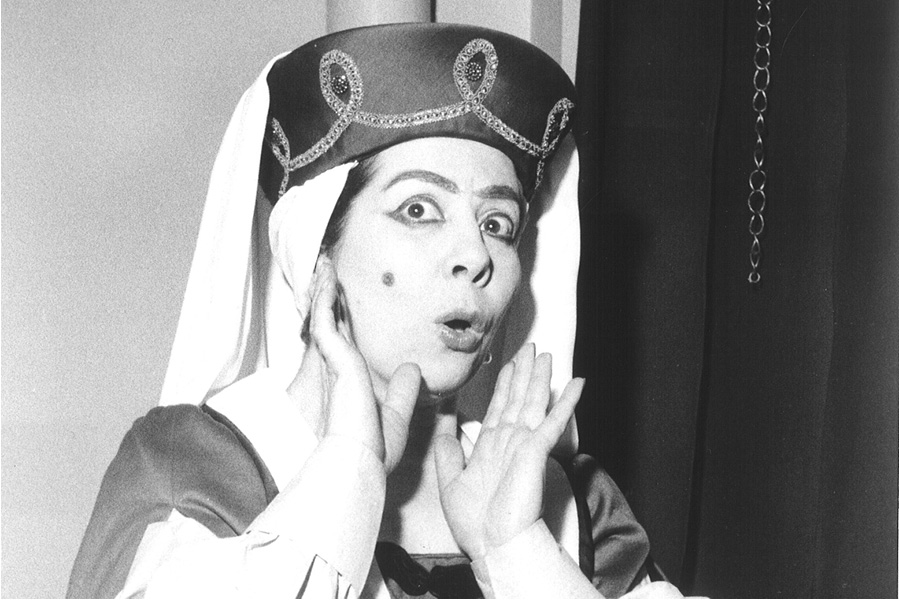
Giulietta Simionato as Mistress Quickly in Lyric's Falstaff (1958)
Giulietta Simionato
Universally acknowledged as the greatest Italian mezzo-soprano of her time, Giulietta Simionato (1910-2010) was a fixture at Lyric for six seasons, from 1954 through 1961. Her 13 roles remain a record for leading mezzos with the company. She debuted opposite Callas in Lyric’s inaugural performance in 1954, playing Adalgisa to Callas’s Norma. Simionato’s Lyric repertoire thereafter gave her opportunities to play every kind of character, from a teenaged boy (Cherubino in The Marriage of Figaro) to several imperious princesses (Amneris in Aida, Eboli in Don Carlo, the Principessa di Bouillon in Adriana Lecouvreur). She also excelled in two contrasting French parts, the title roles of Carmen and Mignon. She could captivate audiences with her gift for comedy in The Barber of Seville and Falstaff, and she could also leave them emotionally shattered in Il trovatore and Cavalleria rusticana.
Simionato’s colleagues worshiped her, as did the public in every major international opera house. She will remain forever unique among Italian dramatic mezzos, due to the ease with which she moved from one repertoire to another—and always with that stupendous voice, which she could color with the most profound expressiveness. She complemented it with her stage savvy, which enabled her to enter completely into the spirit of any role she sang. Beyond all that was a dedication to her art and a passionate desire to communicate the glory of opera to the audience.
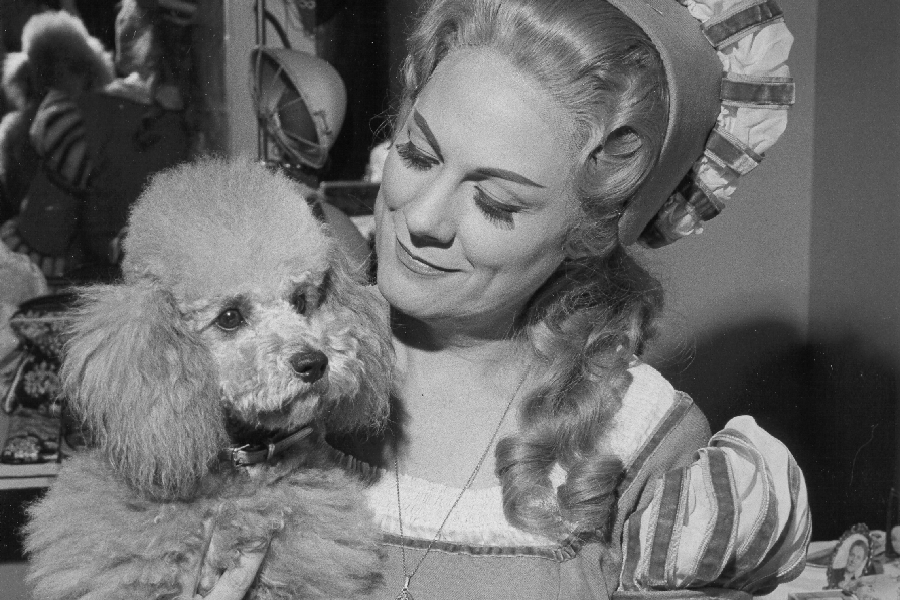
Tebaldi and friend backstage after Mefistofele (1965)
Renata Tebaldi
Chicago had a decade-long love affair with Renata Tebaldi (1922-2004), the Italian soprano who possessed what her compatriot, the mighty conductor Arturo Toscanini, famously called “the voice of an angel.” Tebaldi lavished that voice on Chicago audiences during seven seasons, singing 13 roles from 1955 through 1964.
The first Chicago season for Tebaldi was also the second (and last) for Maria Callas, cited frequently—and pointlessly—at that time as Tebaldi’s “rival.” At Lyric they had only one role in common, Puccini’s Butterfly (Callas in 1955, Tebaldi three years later). Tebaldi was otherwise heard in three other Puccini roles, as well as heroines of Verdi, Giordano, Cilea, and Boito. Among them were Desdemona in Otello, previously a triumph at her Met debut; the glamorous but tragic heroine of Adriana Lecouvreur, her favorite role; Alice Ford in Falstaff, the only comic role she sang here; and the title role of Giordano’s Fedora, her only appearance in that opera for any American company.
As with every major opera venue in America and Europe during the 1950s and '60s, Chicago couldn’t get enough of Tebaldi. Beyond the graciousness of her presence, it was that uniquely enveloping voice that drew every person in the audience to her. Tebaldi performances were special occasions at Lyric, yielding some of the greatest nights in the history of the company.
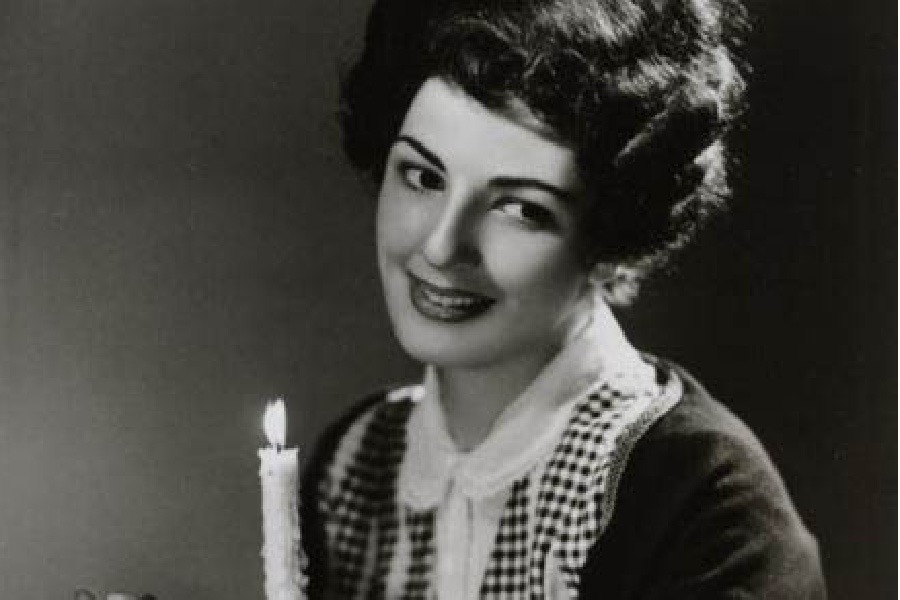
Anna Moffo as Mimì in La bohème
Anna Moffo
Lyric’s standard in a number of leading lyric-soprano roles was established by Anna Moffo (1932-2006). The ravishingly beautiful American artist began her career in 1956 with Radiotelevisione Italiana, triumphing onscreen as Butterfly. The sensation created by the unknown 24-year-old was noted by Lyric, who brought her back to her own country to make her American debut the next year. The role was Mimì in La bohème, in which she was paired with the magnificent Swedish tenor Jussi Björling.
Moffo sang her Lyric repertoire almost exclusively in Italian, the sole exception being her final role with the company in 1958, which was her only Lyric role in French: Philine in the only production at Lyric to date of Thomas’s Mignon. In between Mimì and Philine were Susanna, Lucia, Nannetta (Falstaff), Liù (Turandot), Lauretta (Gianni Schicchi), and Gilda (Rigoletto). In all of these operas, audiences were entranced by Moffo. The rest of the world soon followed, with her career achieving superstar status after her Met debut in the role that became her signature worldwide, Violetta in La traviata, in 1959.
At a time when so many of her colleagues adopted a “stand-and-deliver” style on the operatic stage, Moffo was a “triple threat”: she looked her roles to perfection, sang them exquisitely, and was a consummate actress. Her talent extended to success in films and her own show on Italian television.
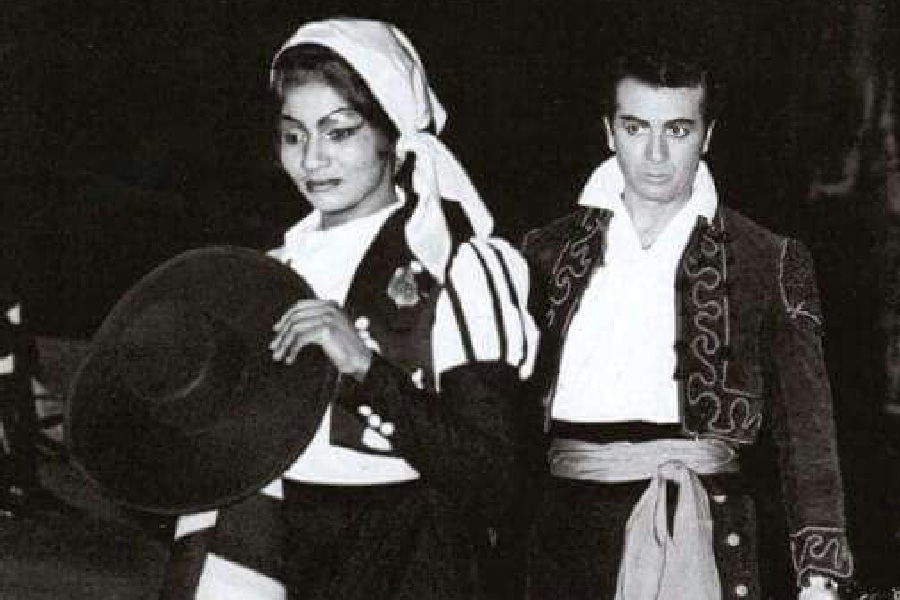
Grace Bumbry and Franco Corelli in Carmen, 1964
Grace Bumbry
Born in St. Louis, Grace Bumbry (b. 1937) was yet another American who rose to fame in Europe before being recognized in this country. She debuted onstage in Paris singing the formidably difficult role of Amneris in Aida, a full-fledged dramatic mezzo-soprano at the age of only 23. It was her appearance as the first Black artist to appear at the Bayreuth Festival, singing Venus in Tannhäuser, that made her big news internationally. By the time she arrived at Lyric in 1963, she’d achieved superstardom, and the Chicago audience was lucky to hear her over nearly two decades in many of her signature roles.
Bumbry’s debut, in the supporting role of Ulrica in Un ballo in maschera, was essentially a prelude to the star parts that were hers at Lyric thereafter: Venus, Carmen, Eboli in Don Carlo, Delilah, Azucena in Il trovatore, and the heroines of Cavalleria rusticana, Macbeth, Salome, Tosca, and Ernani (her final Lyric appearance, 1984).
Bumbry’s performances have often been described as “electrifying,” and that word could hardly be more appropriate. To hear her storm through Eboli’s climactic “O don fatale” in Don Carlo, or to be seduced by her seductive “Mon coeur” from Samson and Delilah, was to be in the presence of extraordinary beauty of voice, matched by arresting glamour and the kind of personality that are what star quality is all about.
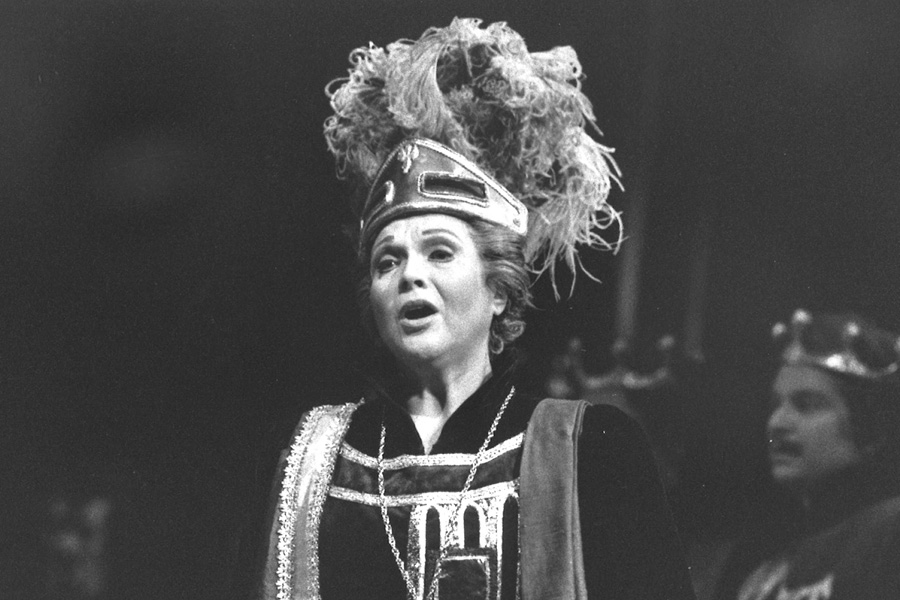
Marilyn Horne in Tancredi, 1987/88
Marilyn Horne
Pennsylvania-born Marilyn Horne (b. 1934), who at the height of her career was hailed as “The World’s Greatest Singer” by Opera News magazine, sang eight roles at Lyric in eight seasons, from 1961 through 1988/89. Horne’s debut role here will come as a surprise to anyone who knows her artistry only from the Rossini operas for which she was so celebrated. She was first heard at Lyric as Lora, the female lead in The Harvest, an opera by the Italian-American composer Vittorio Giannini—the first world premiere in Lyric’s history.
When Horne returned in 1971, it was to star in an opera she was already making her own, Rossini’s L’italiana in Algeri. Her matchless vocal dexterity and comic flair won raves, as did her heroic singing the following season opposite frequent colleague Joan Sutherland. The duo made Lyric history when one of their performances of Rossini’s drama Semiramide was heard on the first live Lyric opening-night broadcast on WFMT. The rest of Horne’s Lyric roles were a mix of comedy (Rosina in The Barber of Seville, Mistress Quickly in Falstaff) and formidable “trouser roles” she referred to as her “General Horne” parts: two Handel title roles, Rinaldo (in concert) and Orlando, and later the title role of Rossini’s Tancredi.
In everything she sang at Lyric, Horne showed all the hallmarks of her artistry: a truly great and unmistakable sound, incomparable technique, stylistic brilliance, and vivid personality.
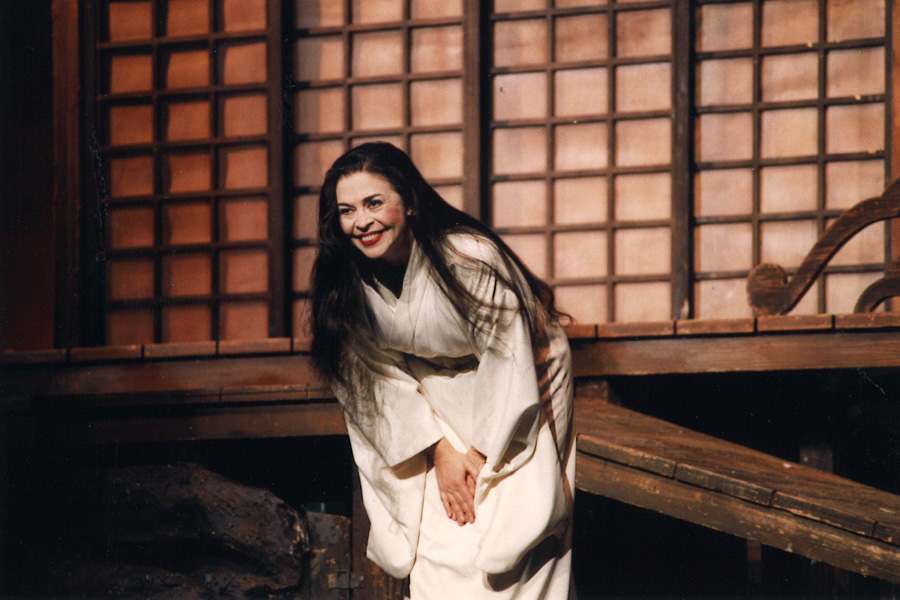
Catherine Malfitano in Madama Butterfly
Catherine Malfitano
New York City native Catherine Malfitano (b. 1948) has a record of achievement at Lyric that is unique among principal sopranos: 20 starring roles over three decades, with styles ranging from Mozart and Verdi to formidable contemporary roles, including three world premieres.
A star of major companies all over America and Europe, Malfitano had a particularly close relationship with Lyric. The company presented her in roles that showed the full breadth of her artistry. Always as highly acclaimed dramatically as vocally, she began at Lyric with the gaiety of Susanna in The Marriage of Figaro (1975), and thereafter was seen and heard in roles that presented much heavier dramatic requirements. Thirty years after her first Butterfly at Lyric, that portrayal remains a thrilling memory for all who experienced it. Equally enthralling were Malfitano’s two signature roles from the twentieth-century German repertoire, the heroines of Lulu and Salome.
Malfitano holds the distinction of having starred at Lyric in the company premiere of Barber’s Antony and Cleopatra (1991/92) and in all three world premieres of operas by American composer William Bolcom, portraying the grasping Trina in McTeague (1992/93), the despairing housewife Beatrice in A View from the Bridge (1999/00), and Victoria, mother of the bride, in A Wedding (2004/05).
Looking for more? Read about the visionary women who helped put Lyric on the map in our list of Trailblazing women who made Lyric history.
Photo credits: Nancy Sorensen, Tony Romano, Cheri E., H. Fishman, Lyric Opera of Chicago
